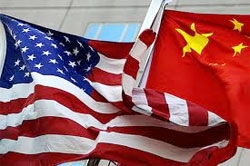US and China sign trade deals, Beijing seeks more
 |
| image source: csmonitor.com |
Top officials from the world's two largest economies met for two days in Washington to try to iron out persistent tensions -- including over the value of China's currency, which the United States says is artificially low.
President Barack Obama's administration, which has been hit hard by economic worries, offered an upbeat take on the talks and highlighted China's willingness to restart talks on resuming US beef imports.
The United States said China also pledged to remain "neutral" on the technological standards for third-generation telephones along with smart grids, so as to permit market access for American companies.
"We were able to make progress on significant issues in a number of areas, and on other issues we have established channels that will allow us to continue our robust engagement and pursue timely solutions," Commerce Secretary Gary Locke said.
Vice Premier Wang Qishan, who headed the 100-strong Chinese delegation, said the two sides had a "candid exchange of views on China-US economic cooperation."
"We've reached many agreements and produced positive outcomes," he told reporters.
But the Chinese side also called for the United States to relax its export controls -- turning the tables on the United States, which frequently presses Beijing to open its markets.
"In our efforts to increase our imports, we very much hope that those countries still having a trade deficit vis-a-vis China could lift or relax export controls towards China," Chinese Commerce Minister Chen Deming said.
"Therefore if the United States could offer substantial export facilitation to China, and allow an increase of its exports to China, this would be a help against the high unemployment rate in the United States today," he said.
The United States restricts a range of goods to China that are "dual-use" -- meaning that the technology could be put to military use. US businesses have also long worried about counterfeiting of products in China.
US Trade Representative Ron Kirk said that China agreed to do more to crack down on theft of intellectual property theft.
"We expect to see concrete and measurable results, including increased purchase and use of legal software, steps to eradicate the piracy of electronic journals, more effective rules for addressing internet piracy and a crackdown on landlords who rent space to counterfeiters in China," Kirk said.
Agriculture Secretary Tom Vilsack pointed to "progress" over US beef, which was banned by China among other countries in 2003 over concerns about mad-cow disease.
"Technical talks will resume as soon as possible with the goal of reopening China’s market in early 2011," Vilsack said.
US officials said that China also pledged to keep off the books rules on "indigenous innovation," which state that high-tech goods must hold Chinese intellectual property rights. China rescinded such guidelines early this year after an international outcry.
Topping other concerns, US officials -- and particularly members of Congress -- have pressed China to let its currency appreciate, accusing Beijing of keeping its yuan low to pump out more exports.
Chen said China "has stated again and again its firm position" that it will reform its yuan "to improve the flexibility of the exchange rate regime and also to stabilise the value of the currency."
But Chen questioned if the size of the US trade surplus had been overestimated, saying that China often exports back finished products made of components imported from the United States.
Such trade "is hardly affected by the fluctuations of currencies," he said.
Many analysts believe that China is determined to move methodically on its currency rates, fearing that any sudden revaluation would jolt its manufacturing hubs and trigger social instability.
What the stars mean:
★ Poor ★ ★ Promising ★★★ Good ★★★★ Very good ★★★★★ Exceptional
Related Contents
Latest News
More News
- Russian President congratulates Vietnamese Party leader during phone talks (January 25, 2026 | 09:58)
- Worldwide congratulations underscore confidence in Vietnam’s 14th Party Congress (January 23, 2026 | 09:02)
- Political parties, organisations, int’l friends send congratulations to 14th National Party Congress (January 22, 2026 | 09:33)
- 14th National Party Congress: Japanese media highlight Vietnam’s growth targets (January 21, 2026 | 09:46)
- 14th National Party Congress: Driving force for Vietnam to continue renewal, innovation, breakthroughs (January 21, 2026 | 09:42)
- Vietnam remains spiritual support for progressive forces: Colombian party leader (January 21, 2026 | 08:00)
- Int'l media provides large coverage of 14th National Party Congress's first working day (January 20, 2026 | 09:09)
- Vietnamese firms win top honours at ASEAN Digital Awards (January 16, 2026 | 16:45)
- ASEAN Digital Ministers' Meeting opens in Hanoi (January 15, 2026 | 15:33)
- ASEAN economies move up the global chip value chain (December 09, 2025 | 13:32)

 Tag:
Tag:




















 Mobile Version
Mobile Version